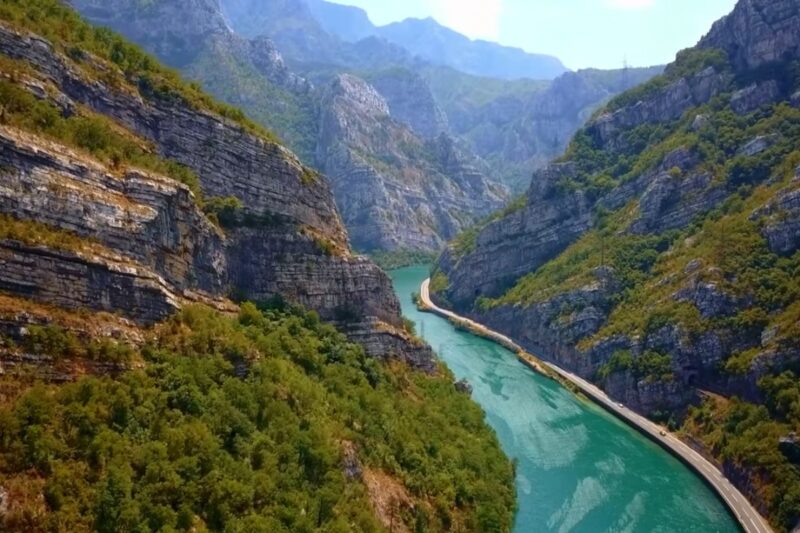In a sobering statistic, over 600 people have fallen victim to land mine explosions in Bosnia and Herzegovina since the end of the Bosnian War in 1995. This staggering impact serves as a stark reminder of the ongoing dangers that continue to threaten travelers to this captivating Balkan nation.
As a former journalist who has extensively explored the region, I can attest to the allure of Bosnia and Herzegovina’s cultural richness and natural beauty. From the awe-inspiring Stari Most bridge in Mostar to the vibrant streets of Sarajevo, this country offers a unique glimpse into the resilience of the Bosnian people. However, the U.S. government’s recent travel advisory cautions that increased vigilance is essential to ensure a safe and rewarding journey.
Key Takeaways
- The U.S. government has issued a travel advisory for Bosnia and Herzegovina, urging increased caution due to the threats of terrorism and land mines.
- Terrorist groups continue plotting possible attacks in the country, targeting tourist locations, transportation hubs, and other public areas.
- Minefields and land mines pose a serious risk to travelers, with the advisory recommending travelers remain on hard-surfaced roads to avoid the dangers.
- Travelers are encouraged to enroll in the Smart Traveler Enrollment Program (STEP) and review the country’s security report for the latest information.
- Being aware of your surroundings and monitoring local media are crucial safety precautions for visitors to Bosnia and Herzegovina.
Bosnia and Herzegovina Travel Advisory Overview

The U.S. government advises travelers to exercise increased caution when visiting Bosnia and Herzegovina due to the persistent risk of terrorism and land mines. Terrorist groups continue to plot potential attacks in the country, targeting tourist areas, transportation hubs, and other public locations frequented by both locals and visitors. In addition, the presence of minefields and unexploded ordnance throughout the region poses a significant threat, with several people being killed or injured each year.
Risk Level and Precautions
The U.S. Department of State has issued a travel advisory for Bosnia and Herzegovina, urging travelers to be vigilant and take appropriate safety measures. This includes remaining aware of your surroundings, monitoring local media for updates, and staying on well-traveled, paved roads to minimize the risk of encountering land mines. Enrolling in the Smart Traveler Enrollment Program (STEP) is also recommended, as it allows the U.S. government to provide emergency assistance and important alerts to American citizens traveling in the region.
Terrorism and Land Mine Threats
Terrorist groups, such as those based in the Balkan region, continue to plot possible attacks in Bosnia and Herzegovina. These groups could strike with little or no warning, targeting a variety of locations that are popular with tourists, including historical sites, cultural landmarks, and public transportation hubs. The ongoing presence of minefields and unexploded ordnance from the Bosnian War also poses a serious threat, with numerous casualties reported each year.
Safety and Security Concerns
When traveling to Bosnia and Herzegovina, it’s crucial to be aware of the safety and security risks in the region. One of the primary concerns is the presence of landmines and unexploded ordnance, particularly in isolated mountainous areas and the countryside. Travelers are advised to stay on main roads and paved surfaces, avoid abandoned buildings, and travel only during daylight hours. Reporting any suspicious war relics or unknown items to local authorities is also recommended to help mitigate the dangers of landmines.
Petty and Violent Crime
Tourists in Bosnia and Herzegovina should also exercise caution when it comes to petty and violent crime. Pickpocketing, theft, and assault can occur, especially in crowded urban areas and tourist hotspots like Sarajevo and Mostar. Travelers are advised to keep a close eye on their belongings, avoid carrying large amounts of cash, and be aware of their surroundings, particularly at night.
Demonstrations and Civil Unrest
The political and social landscape in Bosnia and Herzegovina can be volatile, with the potential for demonstrations and civil unrest. Travelers should monitor local media for updates and avoid any large gatherings or protests, as they can quickly turn violent. In the event of a demonstration or civil unrest, it’s best to seek shelter in a secure location and follow the instructions of local authorities.

Entry and Exit Requirements
Visiting Bosnia and Herzegovina as a traveler from the United States requires careful attention to the country’s entry and exit requirements. Ensuring your passport is valid for at least three months beyond your expected departure date is crucial, as different rules may apply for those traveling with temporary or emergency travel documents. It’s advisable to check with the nearest Bosnian foreign representative before embarking on your journey to confirm the latest visa information and any registration protocols for extended stays in the country.
Passport Validity
Visitors to Bosnia and Herzegovina must have a valid passport that extends at least three months past their planned departure date. This is a standard requirement, and travelers should ensure their passport meets this criterion to avoid any issues at the border. Failure to have a properly valid passport may result in denied entry or complications during the trip.
Visa Information
The visa requirements for Bosnia and Herzegovina can vary depending on the purpose and duration of your stay. Many U.S. citizens are eligible for visa-free entry for up to 90 days for tourism or business purposes. However, it’s essential to research the latest visa policies and obtain any necessary documentation before traveling to ensure a smooth arrival and departure process.
Registration for Extended Stays
Travelers planning to stay in Bosnia and Herzegovina for more than 72 hours are required to register with the local authorities. This can typically be done at your accommodation, such as a hotel or rental, or at the nearest police station. Registering ensures the government is aware of your presence and can provide assistance if needed during your extended stay in the country.
Health Risks and Precautions
When planning a trip to Bosnia and Herzegovina, it’s essential for travelers to ensure their routine vaccinations are up-to-date and consider additional recommended vaccines based on their specific itinerary and health history. Maintaining good health and safety practices can help minimize the risks associated with visiting this Balkan destination.
Routine and Travel Vaccinations
Travelers to Bosnia and Herzegovina should verify that their measles-mumps-rubella (MMR), diphtheria, tetanus, pertussis, polio, varicella (chickenpox), and influenza vaccinations are current. Depending on the traveler’s plans and medical background, they may also need to consider getting vaccinated for hepatitis A, hepatitis B, and yellow fever.
Food and Water Safety
When it comes to food and water safety in Bosnia and Herzegovina, visitors should exercise caution. Drinking bottled water is recommended, and travelers should avoid consuming unpasteurized dairy products, undercooked meat, and unpeeled fruits and vegetables, as these can potentially carry harmful bacteria or parasites.
Insect-Borne Illnesses
Travelers to Bosnia and Herzegovina should also be aware of the risk of insect-borne illnesses, such as tick-borne encephalitis and Lyme disease. Taking precautions like using insect repellent, wearing long sleeves and pants, and checking for ticks after outdoor activities can help reduce the chances of contracting these types of illnesses.

Transportation and Road Safety
Navigating the roads of Bosnia and Herzegovina requires extra caution, as the country has a high rate of motor vehicle accidents. Many roads throughout the country are poorly lit, and vehicles are often in subpar mechanical condition, posing risks to both drivers and passengers. Additionally, issues such as speeding, drunk driving, and a general lack of respect for traffic laws are common, further exacerbating the challenges of Bosnian travel.
Travelers in Bosnia and Herzegovina are advised to exercise heightened vigilance when behind the wheel. It’s essential to remain alert and adhere to all traffic regulations to minimize the chances of being involved in a collision. Drivers should also be prepared for the varying road conditions, which can range from well-paved highways to unpaved, treacherous mountain routes. Maintaining a defensive driving strategy and keeping a safe distance from other vehicles is crucial for safe travels throughout the Balkans.
| Road Safety Considerations in Bosnia and Herzegovina | Recommended Precautions |
|---|---|
| High accident rates | Maintain vigilance, adhere to traffic laws, and drive defensively |
| Poorly lit and maintained roads | Exercise extra caution, especially at night, and be prepared for varying road conditions |
| Speeding, drunk driving, and disregard for traffic laws | Avoid risky driving behaviors and remain alert to the actions of other motorists |
By being aware of the unique transportation challenges in Bosnia and Herzegovina and taking the necessary precautions, travelers can navigate the country’s roads more safely and confidently, ensuring a secure and enjoyable journey through this Bosnian cultural immersion.
Conclusion
The U.S. government’s travel advisory for Bosnia and Herzegovina emphasizes the need for increased caution due to the threats of terrorism and land mines. Travelers to this Balkan nation should remain vigilant, monitor local media for updates, and follow recommended safety precautions to minimize the risks of landmine explosions, petty and violent crime, and civil unrest. Additionally, it is crucial to ensure compliance with all entry and exit requirements, such as maintaining a valid passport and registering with local authorities for extended stays.
To protect against health hazards, travelers are advised to review their routine and travel vaccination records, ensuring they are up-to-date, and to exercise caution when it comes to food and water consumption. By staying informed and taking proactive measures, visitors to Bosnia and Herzegovina can safely explore the country’s rich cultural and historical attractions while mitigating the potential risks associated with their journey.
Bosnia and Herzegovina is bordered by several countries, with Serbia being the largest. Visitors should be aware of regional dynamics and consider how they might impact travel plans.
Overall, the U.S. government’s travel advisory serves as a valuable guide for those planning to visit Bosnia and Herzegovina, empowering them to navigate the country’s unique landscape and make informed decisions that prioritize their safety and security. By heeding the advisory’s recommendations, travelers can immerse themselves in the Bosnian experience while minimizing the challenges and uncertainties that come with visiting this dynamic and historically significant destination
FAQ

What are the main risks and precautions for travelers to Bosnia and Herzegovina?
The U.S. government has issued a travel advisory for Bosnia and Herzegovina, urging increased caution due to the threats of terrorism and land mines. Terrorist groups continue plotting possible attacks in the country, targeting tourist locations, transportation hubs, and other public areas. Additionally, minefields and land mines are present throughout Bosnia and Herzegovina, posing a serious risk to travelers.
How can travelers stay safe from landmine dangers in Bosnia and Herzegovina?
Landmines and unexploded ordnance pose a significant risk, particularly in isolated mountainous areas and the countryside. Travelers are advised to stay on main roads and paved surfaces, avoid abandoned buildings, and travel only during daylight hours. Reporting any suspicious war relics or unknown items to local authorities is also recommended.
What are the entry and exit requirements for visiting Bosnia and Herzegovina?
Travelers to Bosnia and Herzegovina must have a passport that is valid for at least three months beyond the date they expect to leave the country. Different entry rules may apply for those traveling with a temporary passport or an emergency travel document, so it’s important to check with the nearest foreign representative before departure.
What health precautions should travelers take when visiting Bosnia and Herzegovina?
Travelers should ensure their routine vaccinations, such as measles-mumps-rubella (MMR), diphtheria, tetanus, pertussis, polio, varicella (chickenpox), and influenza, are up-to-date before their trip. Additional recommended vaccinations may include hepatitis A, hepatitis B, and yellow fever, depending on the traveler’s specific itinerary and health history.
What are the transportation and road safety concerns in Bosnia and Herzegovina?
Bosnia and Herzegovina has a high rate of motor vehicle accidents, and road conditions can vary greatly throughout the country. Travelers are advised to exercise caution when driving, as many roads are poorly lit, and vehicles are often in poor mechanical condition. Speeding, drunk driving, and a lack of respect for traffic laws are also common issues.

